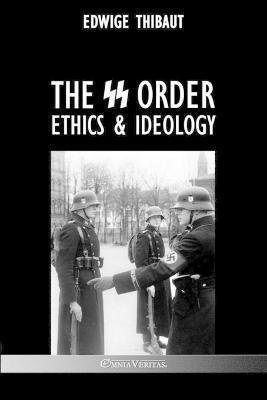The SS Order: Ethics & Ideology

The SS Order: Ethics & Ideology
Who was this SS and, more specifically, the Waffen-SS? What do we know about it? What can we know about it? Such is the mission that Edwige Thibaut, braving the lightness of the century, had the energy to face. This veritable encyclopaedia of the SS could have remained in a drawer forever. In fact, until now, despite having been the subject of thousands of books, the SS is little known, poorly understood, and has often been disfigured by summary accusations, close to the ridiculous or odious.
The Waffen-SS, its most famous emanation, was the most extraordinary political-military formation that humanity has ever known. During the Second World War, the Waffen-SS had a million volunteers from twenty-eight different countries. All these boys had come of their own accord to offer their lives (402,000 died in battle) for a cause that had taken every ounce of their physical life and will. The SS was only a handful at the beginning of Hitlerism. When one looks critically at the course and conclusion of the war in 1945, one sees the culmination of a long process that began with the emergence of the biblical religions, namely that morality and the notion of sin replaced the sense of honour and politics. The worthy adversary has been transformed into an absolute enemy, the bearer of all the vices that oppose 'civilisation' and must be converted or eliminated at all costs.
Now a global war was waged not only between peoples, but between different world views, some based on the rights and equality of all people, universalist and nomadic individualism, and others on the mystique of race, the valorisation of the heroic attitude overcoming the divisions of time, and community value. Considering that there are laws that are superior to those of states, the notion of crime, which had previously been exclusively individual, was broadened into "crimes against humanity" and applied to a system, an ideology and even an entire nation.
PRP: 289.33 Lei
Acesta este Prețul Recomandat de Producător. Prețul de vânzare al produsului este afișat mai jos.
260.40Lei
260.40Lei
289.33 LeiLivrare in 2-4 saptamani
Descrierea produsului
Who was this SS and, more specifically, the Waffen-SS? What do we know about it? What can we know about it? Such is the mission that Edwige Thibaut, braving the lightness of the century, had the energy to face. This veritable encyclopaedia of the SS could have remained in a drawer forever. In fact, until now, despite having been the subject of thousands of books, the SS is little known, poorly understood, and has often been disfigured by summary accusations, close to the ridiculous or odious.
The Waffen-SS, its most famous emanation, was the most extraordinary political-military formation that humanity has ever known. During the Second World War, the Waffen-SS had a million volunteers from twenty-eight different countries. All these boys had come of their own accord to offer their lives (402,000 died in battle) for a cause that had taken every ounce of their physical life and will. The SS was only a handful at the beginning of Hitlerism. When one looks critically at the course and conclusion of the war in 1945, one sees the culmination of a long process that began with the emergence of the biblical religions, namely that morality and the notion of sin replaced the sense of honour and politics. The worthy adversary has been transformed into an absolute enemy, the bearer of all the vices that oppose 'civilisation' and must be converted or eliminated at all costs.
Now a global war was waged not only between peoples, but between different world views, some based on the rights and equality of all people, universalist and nomadic individualism, and others on the mystique of race, the valorisation of the heroic attitude overcoming the divisions of time, and community value. Considering that there are laws that are superior to those of states, the notion of crime, which had previously been exclusively individual, was broadened into "crimes against humanity" and applied to a system, an ideology and even an entire nation.
Detaliile produsului









